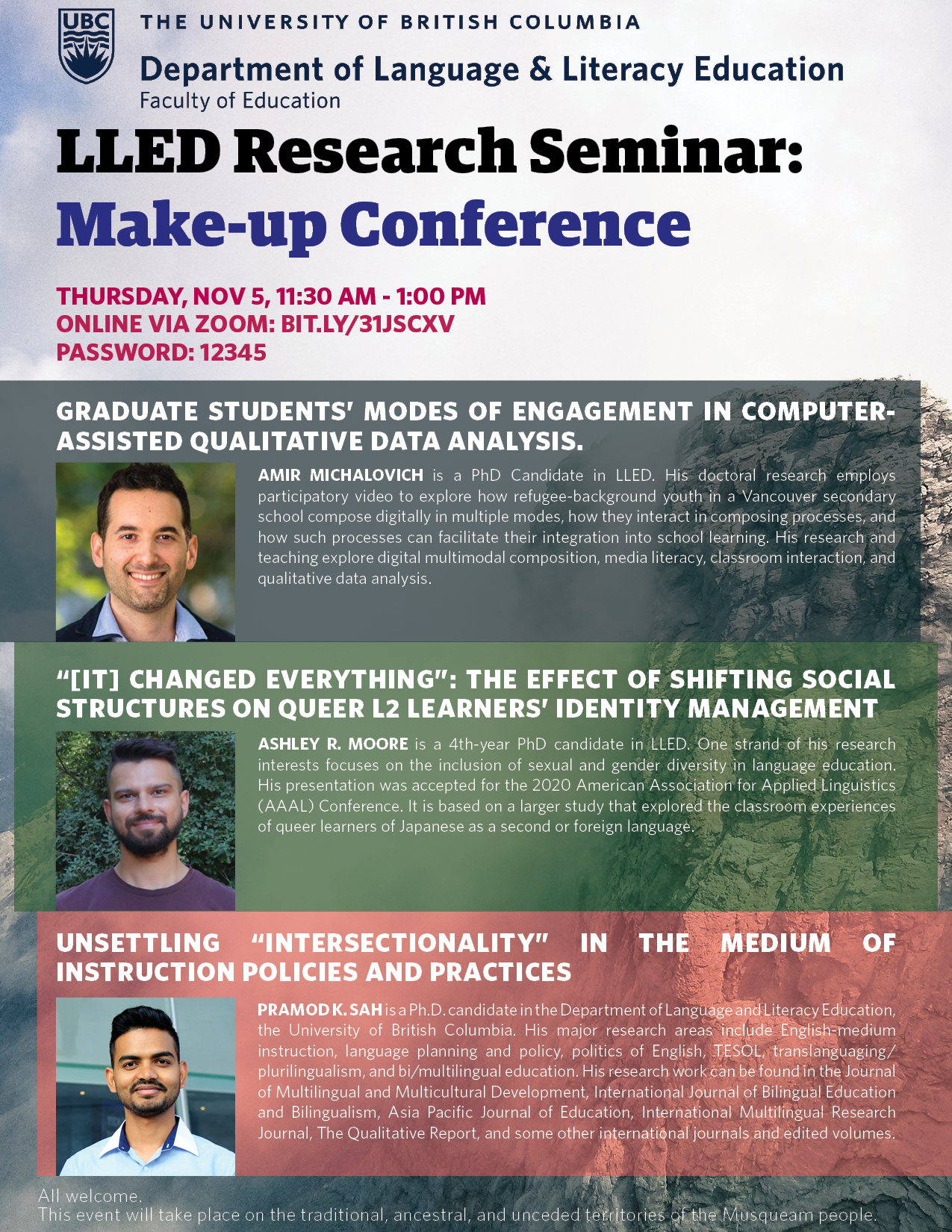Venue: Online via Zoom
Presenters Amir Michalovich, Ashley Moore, Pramod Sah
Zoom Link: ubc.zoom.us/j/69076993360?pwd=aUljSTF5TDR2Q0UvYmV4KzdZckRGdz09
Password: 12345
Make-up Conference Schedule
| 11:30-11:40 |
Introduction + Land acknowledgement |
10 minutes |
|
11:40-11:50 11:50-12:00 |
Presentation 1 (Amir Michalovich) Discussion |
10 minutes 10 minutes |
| 12:00-12:05 | Break | 5 minutes |
|
12:05-12:15 12:15-12:25 |
Presentation 2 (Ashley Moore) Discussion |
10 minutes 10 minutes |
| 12:25-12:30 | Break | 5 minutes |
|
12:30-12:40 12:40-12:50 |
Presentation 3 (Pramod Sah) Discussion |
10 minutes 10 minutes |
| 12:50-12:55 | Concluding remarks | 5 minutes |
Graduate students’ modes of engagement in computer-assisted qualitative data analysis.
Presented by Amir Michalovich
Computer-Assisted Qualitative Data Analysis (CAQDAS) is becoming increasingly prevalent in the social and health sciences and an expected skill of many researchers. CAQDAS is much less structured than the use of quantitative analysis software. However, actual CAQDAS practices and challenges are insufficiently studied, especially among graduate students. The study addresses this gap through analysis of fifteen semi-structured interviews with graduate students from different fields in a Canadian university. Analysis was guided by concepts from the Technology Acceptance Model (TAM) and the CAQDAS Postgraduate Learning Model (CPLM). Findings suggest that graduate students hold high expectations of the analytic affordances of CAQDAS, yet experience significant challenges in actualizing those expectations, due to the perceived complexity of CAQDAS, coupled with insufficient training. In this context, students manifest two divergent modes of engagement in CAQDAS—focused or comprehensive—each of which entails substantial implications for their education and practice as emerging qualitative researchers.
“[It] Changed Everything”: The Effect of Shifting Social Structures on Queer L2 Learners’ Identity Management
Presented by Ashley Moore
Despite a growing body of knowledge regarding the relevance of queer people and their lives to language education, we still know little about the power of classrooms, institutions and larger macro structural forces to shape—and be shaped by—the identity experiences of queer L2 learners. In this presentation, I share a comparative analysis of the identity dilemmas and decisions of two queer learners as they studied Japanese in their home countries (the United States and Romania) and Japan. The findings show that the participants had learned to view their queer identities as incompatible with the compulsory cisgenders and heterosexuality reproduced in the social setting of the L2 classroom. My analysis underscores the crucial role that institutional policies and practices have on the well-being of queer students. The comparative analysis also highlights the objective/subjective duality of macro social structures and how they come to mean in the lives of learners.
Unsettling “Intersectionality” in the medium of instruction policies and practices
Presented by Pramod Sah
Drawing on a critical ethnography of medium of instruction (MoI) policy in a public school in Nepal, this presentation unpacks an “intersectionality” (Jiménez-Castellanos & García, 2017; Levon, 2015) in the MoI policy practices to understand varied modes of discrimination and privilege. An intersectional analysis has revealed a complex system of inequalities and injustice for ethnolinguistic, religious, caste, gender, and class minorities through an appropriation of nationalist and neoliberal dispositions in the MoI policy. In this presentation, I will also discuss the theoretical and methodological significance of intersectionality, often missed out in language planning and policy research (Block, 2018), for transforming MoI policy experiences, while also providing insights for policymakers to revisit MoI policies for more inclusion, equity, and justice.
